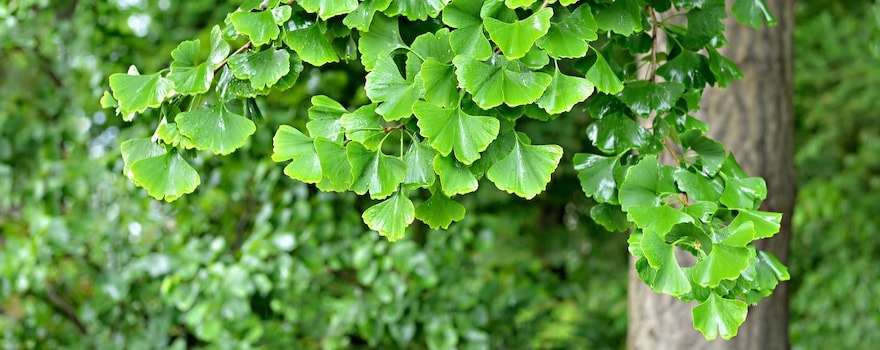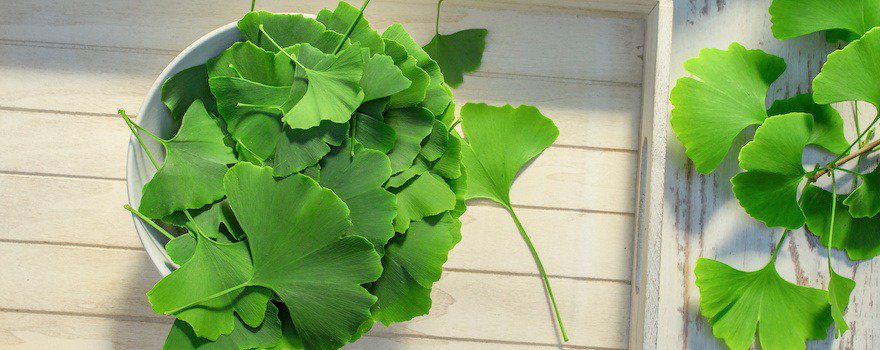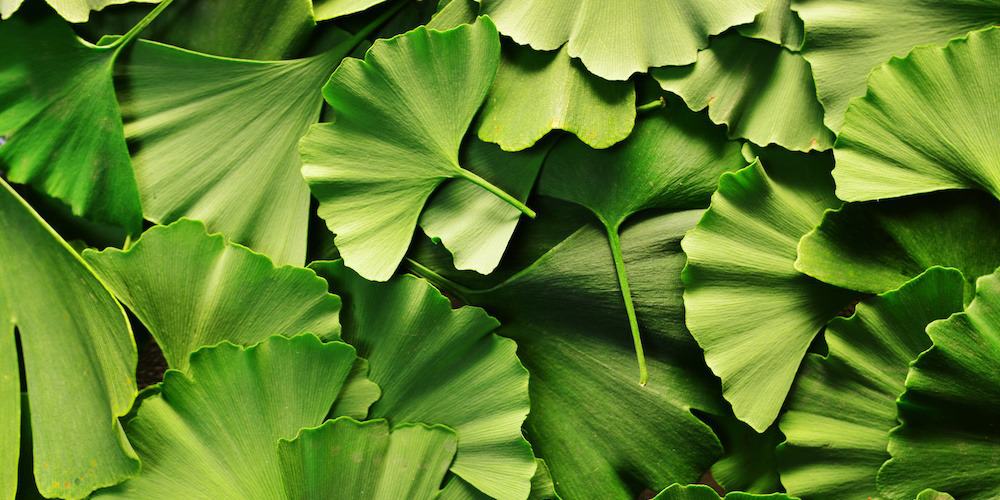BENEFITS OF GINKGO BILOBA
✓ Source of antioxidants, combats the effects of aging
✓ Improves blood circulation
✓ Boosts memory
✓ Reduces anxiety
✓ Limits premenstrual syndrome symptoms
What is ginkgo biloba?
Ginkgo biloba is a tree and the only surviving member of the Ginkgoaceae family. This venerable family is the oldest known tree species, having appeared on Earth 270 million years ago, well before the dinosaurs!
The species is native to China. It arrived in Japan in the 12th century and then in Europe at the beginning of the 18th century. The lifespan of ginkgos is very long: it has no known predators except humans and the climate, which is why ginkgos can be considered living fossils.

A ginkgo biloba planted in a Japanese botanical garden, for example, reaches the age of 1250 years. And the first specimen planted in France in 1778 at the Jardin des Plantes in Montpellier is still alive! The word “ginkgo” comes from the Chinese Yin Kuo, meaning “silver apricot”. This is how the Chinese refer to its fruits. “Biloba” comes from the shape of its leaves, which are split into two lobes.
Ginkgo biloba has been known in traditional Chinese medicine for millennia. The Chinese traditionally use the fruit kernel to treat asthma and respiratory disorders.
In the West, its leaves are preferred in extract form. It is primarily used to improve blood circulation and for the brain: it helps treat memory disorders and related diseases, particularly Alzheimer’s disease. Its active compounds are also rich in antioxidants, helping fight against cellular aging.
Ginkgo is found in numerous medications or dietary supplements to improve memory or blood circulation.
Its benefits make it an excellent ally for the elderly to reduce age-related issues.
Nutritional Composition
- Antioxidants: flavonoids
- Terpenes: ginkgolides, bilobalides

The Benefits of Ginkgo Biloba
🥝 Source of antioxidants, combats the effects of aging
The richness in flavonoids and terpenes of ginkgo gives it antioxidant properties. Antioxidants help fight against the effects of free radicals.
These radicals attack cells, with consequences for skin and hair aging, but also long-term risks of cancer or degenerative diseases.
Ginkgo biloba can also fight against age-related inflammations: such as arthritis, irritable bowel syndrome, or certain cancers.
This study conducted by the Federal University of Rio Grande do Sul in Brazil on rats confirms the antioxidant power of ginkgo biloba extract.
This meta-analysis aggregating several studies on ginkgo biloba, shows the effectiveness of ginkgo biloba leaf extract on several age-related diseases (cognitive disorders, memory loss, senior depression…).
♻️ Improves blood circulation
In traditional Chinese medicine, the leaves and seeds of ginkgo are used to “open the energy channels” of various organs, like the kidneys, liver, or lungs.
This tree has vasodilatory action, anticoagulant and anti-aggregative properties (prevents blood clot formation).
This study conducted by the Hebei Medical University in Shijiazhuang, China, among patients with cardiovascular disease verifies these claims. It shows that people treated with ginkgo biloba extract immediately benefited from increased blood flow to all organs. A 12% increase in nitric oxide levels in the blood, an essential compound for good blood circulation, was observed on average.
👩🏫 Boosts memory
Ginkgo biloba is traditionally prescribed to improve brain functions, notably memory. Some of its components, particularly flavonoids and terpenes, are responsible for this property. By helping to better oxygenate our neurons, they aid in better memorization.
Likewise, it is proven effective for individuals suffering from psychiatric disorders or dementia. This benefit can be explained by increased blood flow to the brain following its consumption.
The World Health Organization has recognized the effectiveness of ginkgo biloba extract for treating symptoms of vascular or degenerative dementia (memory loss, attention disorders, depression).
This study by Liberty University in Lynchburg, USA, conducted on 262 healthy patients aged 60 and older demonstrated these benefits. Indeed, those who were administered ginkgo biloba showed improvements in memory, attention, concentration, and even well-being, more so than those who took a placebo.
This review of four scientific studies, published in 2018, shows that consuming ginkgo can significantly reduce a range of symptoms related to dementia during 22 to 24 weeks of treatment.
On the other hand, studies related to the effectiveness of ginkgo biloba in the treatment of Alzheimer’s disease show rather contradictory results; scientific research must continue.
🧘🏻♀️ Reduces anxiety
A more common but difficult to treat issue, anxiety can be resolved with natural remedies such as ginkgo biloba.
In this study conducted by a psychiatric clinic in Germany on 170 people suffering from anxiety disorders, part of the patients were treated with a placebo, while the other part with a standardized extract of ginkgo (EGb 761 at 480 mg or 240 mg). A significant reduction in anxiety symptoms was observed in the group treated with the highest dose of ginkgo biloba.
🌺 Limits premenstrual syndrome symptoms
Premenstrual syndrome (PMS), which occurs in women before their periods, is a combination of physical and mental symptoms: irritability, anxiety, fatigue, headaches, abdominal pain, water retention…
Often mild, these disorders can be disabling for some women. Consuming ginkgo biloba during this period can reduce these symptoms.
It is still unknown which active components of the plant are effective in treating these disorders, and more in-depth scientific research should take place.
This study from Shahid Beheshti University of Medical Sciences in Tehran conducted among 90 students shows that consuming ginkgo biloba leaf extracts three times a day during the premenstrual period can reduce PMS symptoms by 23%.

How to consume ginkgo biloba?
The standardized extract of ginkgo biloba
In the West, we most often use ginkgo biloba leaves for internal use. They are consumed dried in tea form. They are also available as loose powder, capsules, and also in bottle or ampoule form.
Dietary supplements commonly recommended by doctors are standardized extracts of ginkgo biloba named EGb 761 and Li 1370. They have a regulated content of active principles (glucoflavonoids and terpeno-lactones).

Ginkgo biloba seeds
The Chinese consume ginkgo biloba seeds for both its therapeutic effects and as food: the seeds are then dried and roasted (raw, they are toxic).
Ginkgo biloba for external use
The Chinese also traditionally use leaves as poultices for burns, ulcers, or to improve healing.
Due to its antioxidant properties, ginkgo is found as an ingredient in the making of anti-aging and anti-redness creams.
Dosage
⏳Regarding standardized ginkgo extract, it is recommended to consume it occasionally, for one to two weeks, for circulatory or memory problems (when taking an exam, for example). For age-related disorders, the effectiveness of ginkgo biloba has been demonstrated in treatments of at least three months. As for neurodegenerative diseases, it’s best to consult a specialist.
💊In capsules: 120 to 240 mg per day of standardized extract during meals
🍵In tea: 2 to 3 cups per day, with 2 teaspoons of dried leaves per liter of water
🧪In mother tincture: 20 to 40 drops per day
Contraindications and side effects
- Do not consume ginkgo biloba fruits or raw seeds, which are toxic.
- Consuming ginkgo biloba can cause minor digestive issues.
- Due to its anticoagulant and blood-thinning properties, it is recommended to use it with caution. It should not be combined with other products intended to improve blood circulation (ginseng, sage) or with anticoagulant or antiplatelet medications. It is not recommended to use it with aspirin.
- Hemophiliacs should avoid consuming ginkgo biloba, as should epileptics (risk of seizures) and persons undergoing surgery.
History, culture, and market of ginkgo biloba
The longevity of ginkgo biloba is well-proven: it is one of the few living organisms that survived the Hiroshima atomic explosion! Ginkgo biloba trees often reach the age of a thousand years.
In France, it is also nicknamed “tree of 40 shields,” referring to the fortune paid by a French botanist in 1788 to acquire its seedlings. It also derives from the golden color that the leaves of ginkgo biloba take on in autumn.
In the wild, it is now almost extinct. The ginkgo we know today is a cultivated species, mainly in Asia, but also in the United States and southern France to meet the needs of the pharmaceutical industry, as well as an ornamental species.
It is indeed an easy tree to grow. It is often found in parks and cities in France. Look closely, its lobed leaves are very distinctive! Moreover, the ginkgo biloba leaf is the symbol of the city of Tokyo.
It is appreciated in cities for its strong resistance to pollution. The only downside: female trees produce fruits that, when they fall, emit a very unpleasant odor. Want to plant a ginkgo biloba in your garden? Choose a male specimen to avoid this inconvenience!
Report prepared by Pauline Petit and Charlotte Jean
Sources and scientific studies
Bridi R, Crossetti FP, Steffen VM, Henriques AT, 2001. The antioxidant activity of standardized extract of Ginkgo biloba (EGb 761) in rats.
Wei Zuo, Feng Yan, Bo Zhang, Jiantao Li, Dan Mei, 2017. Advances in the Studies of Ginkgo Biloba Leaves Extract on Aging-Related Diseases.
Wu YZ, Li SQ, Zu XG, Du J, Wang FF, 2008. Ginkgo biloba extract improves coronary artery circulation in patients with coronary artery disease: contribution of plasma nitric oxide and endothelin-1.
Mix JA, Crews WD Jr, 2002. A double-blind, placebo-controlled, randomized trial of Ginkgo biloba extract EGb 761 in a sample of cognitively intact older adults: neuropsychological findings.
Savaskan E, Mueller H, Hoerr R, von Gunten A, Gauthier S, 2018. Treatment effects of Ginkgo biloba extract EGb 761® on the spectrum of behavioral and psychological symptoms of dementia: meta-analysis of randomized controlled trials.
Woelk H, Arnoldt KH, Kieser M, Hoerr R, 2007. Ginkgo biloba special extract EGb 761 in generalized anxiety disorder and adjustment disorder with anxious mood: a randomized, double-blind, placebo-controlled trial.
Ozgoli G, Selselei EA, Mojab F, Majd HA, 2009. A randomized, placebo-controlled trial of Ginkgo biloba L. in treatment of premenstrual syndrome.



